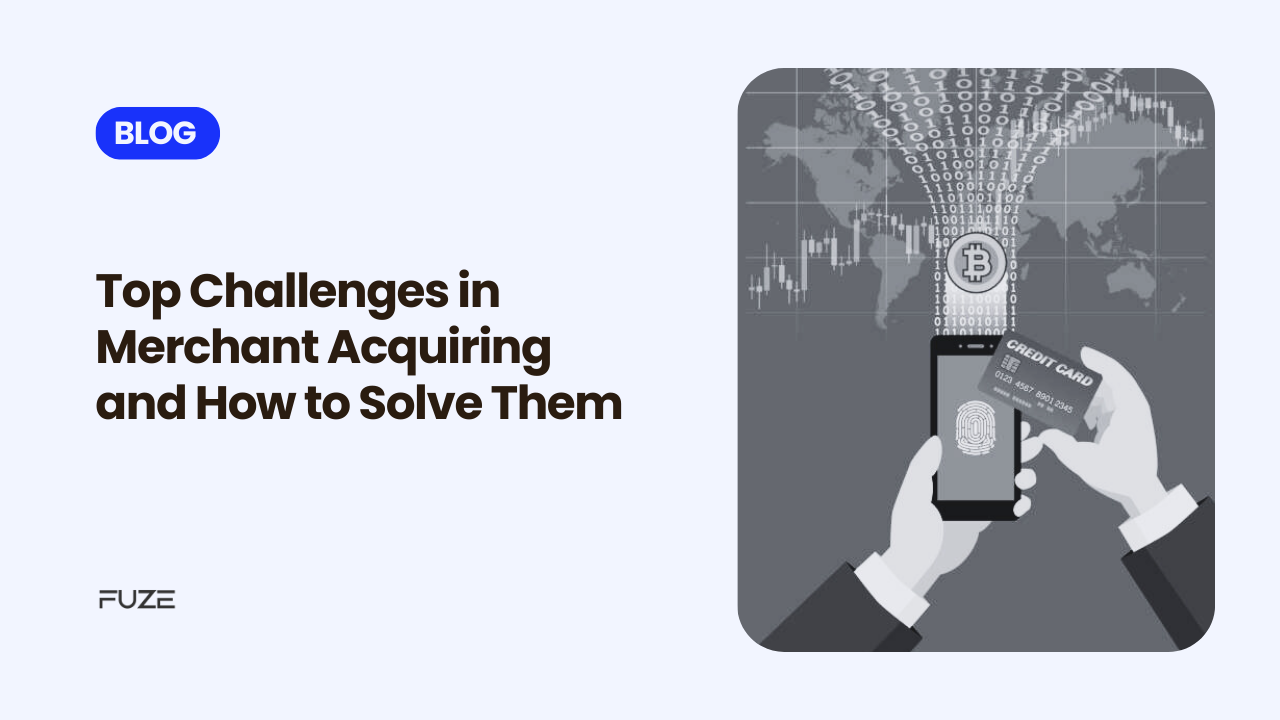Merchant acquiring is a cornerstone of the payments ecosystem, enabling businesses to accept payments and grow their operations. However, the process of onboarding merchants and maintaining seamless merchant payment systems comes with its share of challenges. These challenges can slow down the onboarding process, increase operational costs, and impact customer satisfaction.
In this blog, we’ll explore the key challenges in merchant acquiring, discuss actionable solutions, and explain how Fuze’s innovative merchant acquiring solutions simplify the process.
Understanding Merchant Acquiring
Merchant acquiring refers to the process by which payment processors enable merchants to accept card payments from customers. This involves setting up the infrastructure, managing risks, and ensuring compliance with payment regulations. While the industry has seen remarkable advancements in technology, challenges in merchant acquiring persist.
Top Challenges in Merchant Acquiring
- Onboarding Process Complexity
Onboarding new merchants can be lengthy and cumbersome. This often involves a lot of paperwork, multiple verifications, and compliance checks. For businesses, this can delay operations and deter merchants from partnering with acquirers.
Solution: Automation tools and AI-powered solutions can significantly reduce the time and effort required by digitizing the onboarding process.
- Managing Risk and Fraud
Merchant acquiring carries high risks, such as chargebacks, fraud, and the possibility of non-compliance. In the case of acquirers, balancing the desire to minimize risk with a seamless onboarding process is difficult.
Solution:
Use of machine learning algorithms and real-time fraud detection systems can effectively mitigate risks. Fuze’s platform is loaded with advanced risk management tools, which monitor transactions in real-time, flagging suspicious activities to prevent fraud before it affects the system.
- Integrating Payment Systems
Merchants often require payment systems that are multiple-channel supportable, meaning online, in-store, and mobile. However, integrating all these systems into one unified solution is difficult and leads to compatibility problems.
Solution:
A single, robust platform that supports omnichannel payment systems simplifies integration. Fuze provides APIs to businesses so that they can easily connect various payment channels, allowing merchants to take payments seamlessly across platforms.
- High Transaction Costs
High transaction fees associated with payment processing are a barrier to entry for many merchants. The difficulty in bearing such costs, especially to small businesses, is often experienced by acquirers.
Solution:
Transparent pricing models and cost-efficient solutions like the use of blockchain-based payment systems reduce transaction costs.
- Compliance and Regulatory Challenges
Payment systems have to comply with multiple global and regional regulations, such as GDPR, PCI DSS, and local tax laws. For both acquirers and merchants, these requirements are too overwhelming to navigate.
Solution:
Automate compliance checks and incorporate regulatory updates into the onboarding process. This makes compliance much easier. Fuze’s platform ensures compliance by embedding regulatory frameworks directly into its systems, making it easier for merchants to operate without regulatory risks.
- Limited Merchant Support
Many acquirers fail in offering consistent and accessible support to merchants, such as technical issues or system updates. Poor support can lead to dissatisfaction and churn.
Solution:
A dedicated team of AI-driven chatbots provide 24/7 support to allow merchants to get timely services. Fuze is serious in merchant support and offers robust instruments of customer service that have the ability to address every issue promptly, keeping them satisfied and operational.
- Adapting to New Payment Technologies
The payment industry is highly evolving, with new technologies like digital wallets, cryptocurrencies, and contactless payments on the rise. It is tough for acquirers to follow these trends and implement them in merchant systems.
Solution
Implement scalable, future-proof systems that can adapt to emerging payment technologies. Fuze’s merchant acquiring solutions come with support for multiple payment methods, including cryptocurrencies, making merchants ready for the future.
- Data Security Concerns
Merchants and customers alike are increasingly concerned about data breaches and cybersecurity threats. Ensuring the security of sensitive payment data is a top priority for acquirers.
Solution:
Utilizing tokenization, encryption, and blockchain technology can protect sensitive data and reduce the risk of breaches. Fuze employs state-of-the-art security measures, ensuring all transactions are secure and compliant with industry standards.
- Retaining Small and Mid-Sized Merchants
SMEs tend to have special requirements and tighter budgets. Therefore, it becomes tough for acquirers to retain them in a competitive market. In case the services or costs don’t meet their expectations, they tend to shift.
Solution:
Tailored solutions and flexible pricing models can work wonders in improving retention for SMEs. Fuze has custom packages to meet the needs of small and mid-sized merchants, so the relationship will last longer.
- Scaling Operations Globally
Scaling merchant services across regions with diverse payment preferences, currencies, and regulations can be very challenging for acquirers who have ambitions of global reach.
Solution
Simplifying global scaling by using a multi-currency payment system and localized compliance tools. Fuze’s platform supports cross-border payments that include seamless currency conversions and region-specific solutions for global operations.
How Fuze Simplifies Merchant Acquiring
Fuze addresses the key challenges in merchant acquiring with a suite of innovative features designed to streamline processes and enhance merchant satisfaction. Here’s how:
- End-to-End Onboarding: Fuze automates and digitizes the onboarding process, reducing the time to onboard new merchants and improving their experience.
- Real-Time Risk Management: Advanced fraud detection and risk analysis tools ensure safe and secure transactions.
- Omnichannel Support: With easy API integrations, Fuze enables merchants to accept payments across online, in-store, and mobile platforms.
- Multi-Currency and Crypto Support: Fuze’s platform supports payments in multiple fiat and cryptocurrencies, ensuring merchants stay competitive in a global market.
- Scalable Solutions: Designed to grow with your business, Fuze’s solutions cater to small businesses and enterprises alike.
- 24/7 Merchant Support: Dedicated support ensures that merchants have access to assistance whenever they need it, minimizing disruptions.
The Future of Merchant Acquiring
The merchant acquiring industry is evolving rapidly, with innovations like embedded finance, blockchain, and AI redefining the way payments are processed. To remain competitive, acquirers must invest in technologies that simplify onboarding, enhance security, and meet the diverse needs of merchants.
Fuze’s commitment to delivering cutting-edge merchant acquiring solutions ensures businesses can overcome challenges and thrive in an increasingly digital and interconnected economy.
Conclusion
Merchant acquiring is critical for enabling businesses to accept payments and grow in a globalized economy. While challenges such as onboarding inefficiencies, high fees, and compliance complexities persist, solutions like Fuze’s innovative platform are transforming the landscape.
By automating processes, ensuring compliance, and providing flexible payment options, Fuze empowers acquirers to attract and retain merchants while maintaining a secure and efficient payment ecosystem. As the payment industry continues to evolve, adopting forward-thinking solutions will be key to staying ahead in the competitive world of merchant acquiring.
Disclaimer: Virtual assets carry significant risks, including high volatility and potential loss of your entire investment. They are not backed by governmental protections, and recourse may be limited in case of loss. Always assess your risk tolerance, fully understand the risks, and seek independent financial advice if needed before investing.
Frequently Asked Questions
1. What is merchant acquiring, and why is it important?
Merchant acquiring refers to the process of enabling businesses to accept electronic payments, such as credit and debit card transactions. It is critical for merchants to process payments securely and efficiently, facilitating sales and business growth in an increasingly digital economy.
- What are the main challenges in merchant acquiring?
Key challenges include complex merchant onboarding, high transaction costs, managing fraud and risk, integrating payment systems, ensuring regulatory compliance, and adapting to emerging payment technologies like cryptocurrencies and digital wallets.
- Why is merchant onboarding often so complex?
The onboarding process typically involves multiple steps, including documentation, KYC/AML checks, and system integration. These manual processes can be time-consuming, leading to delays and frustration for merchants.
- How can fraud and risk management be improved in merchant acquiring?
Leveraging advanced technologies like AI and machine learning for real-time fraud detection, along with risk monitoring tools, can significantly enhance security and reduce fraudulent activities in the payment ecosystem.
- How do high transaction fees impact merchants?
High fees associated with payment processing can erode merchant profits, particularly for small and mid-sized businesses. These costs can make merchant acquiring less accessible and competitive for SMEs.







